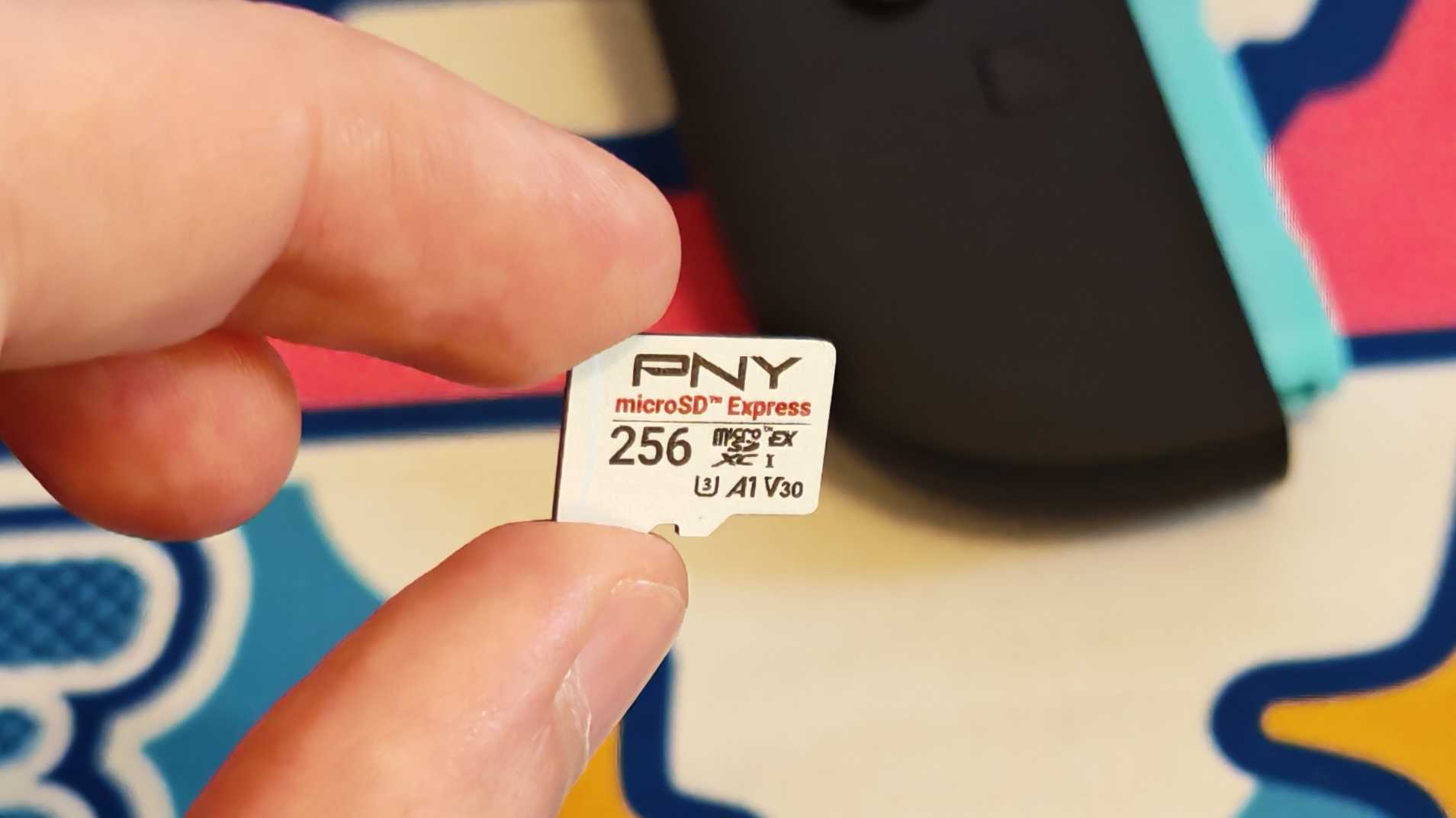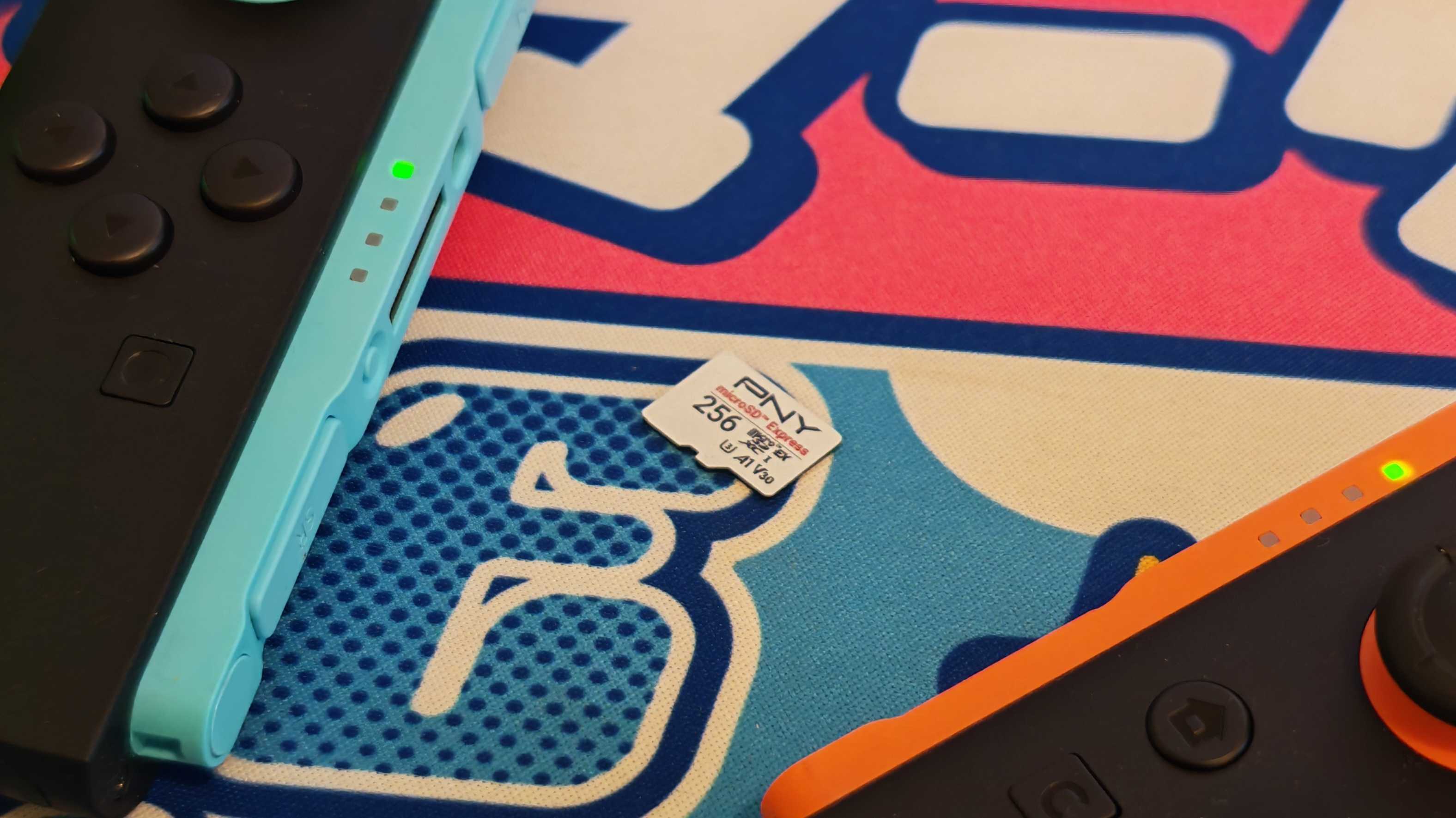TechRadar Verdict
The PNY microSD Express Card is a great choice if you’re searching for a Nintendo Switch 2 storage upgrade that delivers blazing fast performance at a reasonable price and is backed by a lifetime warranty. It’s a shame that the 512GB version is hard to find outside of the US, though, and that there’s no 1TB model yet for those with massive libraries.
Pros
- +
Very strong read and write performance
- +
Great to use with the Nintendo Switch 2
- +
Priced in line with the competition
- +
Five year or “lifetime” warranty
Cons
- -
No 1TB model yet
- -
Newer 512GB version is hard to find outside the US right now
Why you can trust TechRadar
PNY microSD Express Card: review
The PNY microSD Express Card is one of the fastest Nintendo Switch 2 cards that I’ve tested.
In my benchmarks, the 256GB model achieved a staggering 712.42MB/s write speed - blowing past the competition and coming impressively close to the manufacturer’s claimed 750MB/s performance.
It also excels when it comes to read speed, actually achieving above the claimed 890MB/s with 893.74MB/s in my testing. This difference is likely all down to different conditions and equipment, but it’s safe to say that this card is quick. Its read speed is practically neck and neck with the licensed SanDisk microSD Express Card for Nintendo Switch 2 - a model that’s officially endorsed by Nintendo.
What does this all mean in practical terms? Well, the PNY MicroSD Express Card is fantastic to use with a Nintendo Switch 2. Internet providing, games download quickly and everything runs smoothly while you play. I tested the likes of Cyberpunk 2077: Ultimate Edition and Hitman World of Assassination - Signature Edition, two very demanding Nintendo Switch 2 games, and didn’t observe any noticeable performance decrease in either - be that missed frames, slow-to-load models, or increased load times.

Best of all, the 256GB PNY MicroSD Express Card is practically the same price as its major competition. At $59.99 / £59.99 / around AU$100, the leading write speed is a good reason to pick this card over the alternatives. This is the case for the warranty too, with PNY offering a five year or “limited lifetime warranty” in some regions.
This refers to the lifetime of the card (not you) and doesn’t cover you if PNY stops making them, but should otherwise see you through the life of the Nintendo Switch 2 at least - just make sure that you hang on to your proof of purchase and retail packaging in case you need to claim it.
PNY is also one of the few manufacturers offering a cheaper 128GB model, which goes for $44.99 / £39.99 (or even less in sales), allowing players with very modest storage needs to avoid paying more for storage that they don’t need.
Sign up for breaking news, reviews, opinion, top tech deals, and more.
There is a catch when you start looking at variants above 256GB, though. There’s a recently released 512GB model on the market that comes in at $119.99 / around £150, but seems to be very hard to find outside of the US right now. There’s no 1TB model yet either, leaving those with massive libraries better off with the competing Lexar Play Pro microSD Express Card instead.
PNY microSD Express Card: Price and specs
Price | $59.99 / £59.99 / around AU$100 (256GB) |
Capacity | 128GB / 256GB |
Quoted read speed | 890MB/s |
Quoted write speed | 750MB/s |
Benchmarked read speed | 893.74MB/s |
Benchmarked write speed | 713.42MB/s |
Should I buy the PNY microSD Express Card?
Buy it if...
You want high-end performance
The PNY microSD Express Card has the fastest write speed of any Nintendo Switch 2 card that I’ve tested. This is backed up by an excellent read speed, making it a good choice for those after a high performance card.
You’re after peace of mind
With its “lifetime” warranty, the PNY microSD Express Card should comfortably last you the entire life of the Nintendo Switch 2. This could be the first and last microSD Express Card that you buy.
Don't buy it if...
You need bigger storage capacities
The 512GB model appears to be quite hard to find outside of the US, and there’s no 1TB version yet. With this in mind, there are better options for those with big game libraries.
Also consider
Here’s how the PNY microSD Express Card stacks up against two major competitors.
| Row 0 - Cell 0 | PNY microSD Express Card | Lexar Play Pro microSD Express Card | SanDisk microSD Express Card for Nintendo Switch 2 |
Price | $59.99 / £59.99 / around AU$100 (256GB) | $58.98 / £59.45 / AU$119.34 (256GB) | $59.99 / £49.99 / AU$79.95 |
Capacity | 128GB / 256GB / 512GB | 256GB / 512GB / 1TB | 256GB |
Quoted read speed | 890MB/s | 900MB/s | 880MB/s |
Quoted write speed | 750MB/s | 600MB/s | 650MB/s |
Benchmarked read speed | 893.74MB/s | 831.97MB/s | 894.4MB/s |
Benchmarked write speed | 713.42MB/s | 310.03MB/s | 674.1MB/s |
SanDisk microSD Express Card for Nintendo Switch 2
The SanDisk microSD Express Card is the model to choose if you want something that’s been officially endorsed by Nintendo. It has a slower write speed, but a marginally faster read speed to make up for it.
Read our full SanDisk microSD Express Card for Nintendo Switch 2 review
Lexar Play Pro microSD Express Card
Lexar is the current king of you’re after a 1TB microSD Express Card. The brand was one of the first to bring a 1TB model to the market and should be at the top of your list if that’s what you’re after.
Read our full Lexar Play Pro microSD Express Card review
How I tested the PNY microSD Express Card
- Tested over a period of multiple weeks
- Compared to other microSD Express cards
- Measured using standardized benchmark tests
I tested the PNY microSD Express Card alongside multiple other microSD Express units over a period of multiple weeks. During that time I used the card with my personal Nintendo Switch 2, evaluating its performance across a range of the best Nintendo Switch 2 games.
To obtain comparison data, I benchmarked the card against the competition in a series of standardized tests. I measured the sequential read and write speed of each card using a standardized benchmark via CrystalDiskMark in its default flash memory settings.
To do this, I relied on the Lexar Play Pro MicroSD Express Card Reader, which has an active cooling fan.
First reviewed November 2025

Dash is an experienced tech journalist who currently serves as the Gaming Editor at TechRadar, where he helps oversee coverage of video games and related products.
Before joining the team, he was Contributing Writer at PLAY (formerly Official PlayStation Magazine) and has also written articles for many of the UK's biggest gaming magazines including Edge, PC Gamer, and SFX.
Now, when he's not getting his greasy little mitts on the newest hardware or gaming gadget, he can be found listening to J-pop or feverishly devouring the latest Nintendo Switch otome.
You must confirm your public display name before commenting
Please logout and then login again, you will then be prompted to enter your display name.
